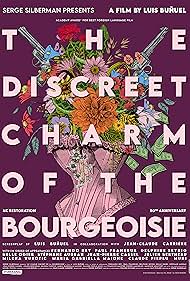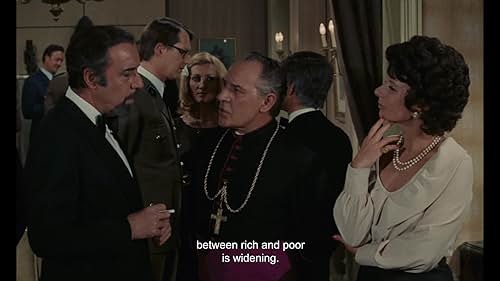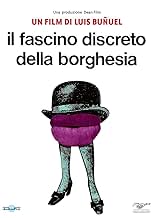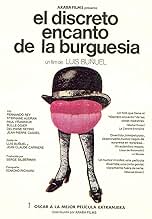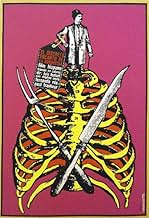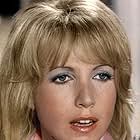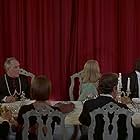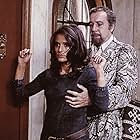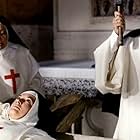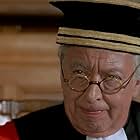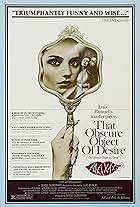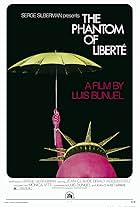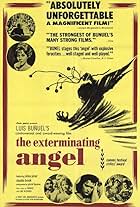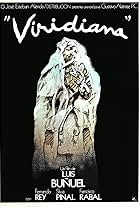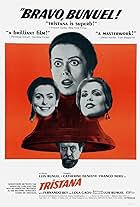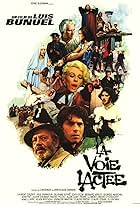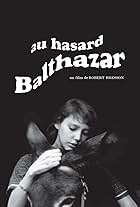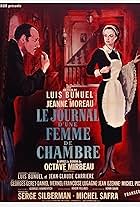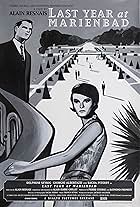ÉVALUATION IMDb
7,8/10
48 k
MA NOTE
Une série de rêves surréalistes, concentrés sur six personnes de la petite bourgeoisie et leurs tentatives constamment interrompues de prendre un repas ensemble.Une série de rêves surréalistes, concentrés sur six personnes de la petite bourgeoisie et leurs tentatives constamment interrompues de prendre un repas ensemble.Une série de rêves surréalistes, concentrés sur six personnes de la petite bourgeoisie et leurs tentatives constamment interrompues de prendre un repas ensemble.
- A remporté 1 oscar
- 7 victoires et 9 nominations au total
Stéphane Audran
- Alice Sénéchal
- (as Stephane Audran)
Histoire
Le saviez-vous
- AnecdotesThe movie includes three of Luis Buñuel's recurring dreams: a dream of being on stage and forgetting his lines, a dream of meeting his dead cousin in the street and following him into a house full of cobwebs, and a dream of waking up to see his dead parents staring at him.
- GaffesAfter Rafael gives the terrorist champagne, his position in the chair changes between shots.
- Citations
Rafael Acosta: You're much better suited for making love than for making war. Vamos, muchacha. Vamos.
- ConnexionsFeatured in Pour le cinéma: Episode dated 16 September 1972 (1972)
Commentaire en vedette
La Charme Discret de la Bourgeoisie is a celebrated film by a well-regarded surrealist auteur. Given that, and given my taste for such things, I went in with high hopes. But I rarely found it more than mildly amusing.
It's undeniably clever. Bunuel's dry humor sparkles, and his gentle social critique hits its marks more often than not. The penultimate shot of Fernando Rey with a slice of ham stuffed in his mouth is one of the funniest and most memorable cinematic images I've encountered in quite a while. And Delphine Seyrig breezes through her scenes with hilariously blithe detachment. But the parts don't quite add up to a greater whole.
The film reaches its peak about halfway through, once a pattern has been established (dinner parties will be attended, but dining will be teasingly withheld) and the central narrative has begun to digress and fragment. As the surreal intrudes upon the quotidian, a delicious sort of suspense sets in. Pity, then, that the last forty-five minutes squander this tension, retreating to tepid farce and a rather obvious critique of upper-crust social mores.
Someone on the film's board once quoted the director as saying, "the bourgeois moral is the immoral thing for me, that which should be combated; the moral founded in our unjust social institutions as the religion, the homeland, the family, the culture, in short, the so-called pillars of the society." Thematically, the film consists of variations on this familiar counter-cultural conceit, and such thinking was certainly voguish in the late 60s and early 70s. It's an interesting and potentially valid argument, but I found the film's handling of the idea superficial, even clichéd.
The same could be said, I suppose, of El Topo or Sweet Movie, but those films transcend glib adherence to fashionable ideologies and period style. I don't think La Charme Discret does that. Of course, it's more an urbane, low-key comedy of manners than a flaming art-bomb thrown through the window of middlebrow complacency, so perhaps the comparison is unfair. As a comedy, it is appealing, in a mild sort of way.
Finally, I was disappointed by the film's look. I understand that the bland stage-set dining rooms are a device, and a successful one. But surreal detours aside, there isn't much to look at. The camera placements and movements are almost ploddingly ordinary, and while they capture the events adequately, they don't do anything interesting with them.
I'm being unkind, of course, and terribly unfair. By stressing these complaints, I'm giving short shrift the wonderful performances and amusingly understated comic dialog. I'm overlooking the fabulously eerie dream sequences and Bunuel's masterful control of tone. I gave La Charme Discret a 7/10 because it IS charming, funny and somewhat intellectually intriguing. But I still came out of the experience feeling a bit let down...
It's undeniably clever. Bunuel's dry humor sparkles, and his gentle social critique hits its marks more often than not. The penultimate shot of Fernando Rey with a slice of ham stuffed in his mouth is one of the funniest and most memorable cinematic images I've encountered in quite a while. And Delphine Seyrig breezes through her scenes with hilariously blithe detachment. But the parts don't quite add up to a greater whole.
The film reaches its peak about halfway through, once a pattern has been established (dinner parties will be attended, but dining will be teasingly withheld) and the central narrative has begun to digress and fragment. As the surreal intrudes upon the quotidian, a delicious sort of suspense sets in. Pity, then, that the last forty-five minutes squander this tension, retreating to tepid farce and a rather obvious critique of upper-crust social mores.
Someone on the film's board once quoted the director as saying, "the bourgeois moral is the immoral thing for me, that which should be combated; the moral founded in our unjust social institutions as the religion, the homeland, the family, the culture, in short, the so-called pillars of the society." Thematically, the film consists of variations on this familiar counter-cultural conceit, and such thinking was certainly voguish in the late 60s and early 70s. It's an interesting and potentially valid argument, but I found the film's handling of the idea superficial, even clichéd.
The same could be said, I suppose, of El Topo or Sweet Movie, but those films transcend glib adherence to fashionable ideologies and period style. I don't think La Charme Discret does that. Of course, it's more an urbane, low-key comedy of manners than a flaming art-bomb thrown through the window of middlebrow complacency, so perhaps the comparison is unfair. As a comedy, it is appealing, in a mild sort of way.
Finally, I was disappointed by the film's look. I understand that the bland stage-set dining rooms are a device, and a successful one. But surreal detours aside, there isn't much to look at. The camera placements and movements are almost ploddingly ordinary, and while they capture the events adequately, they don't do anything interesting with them.
I'm being unkind, of course, and terribly unfair. By stressing these complaints, I'm giving short shrift the wonderful performances and amusingly understated comic dialog. I'm overlooking the fabulously eerie dream sequences and Bunuel's masterful control of tone. I gave La Charme Discret a 7/10 because it IS charming, funny and somewhat intellectually intriguing. But I still came out of the experience feeling a bit let down...
- conedust
- 14 mai 2009
- Lien permanent
Meilleurs choix
Connectez-vous pour évaluer et surveiller les recommandations personnalisées
- How long is The Discreet Charm of the Bourgeoisie?Propulsé par Alexa
Détails
- Date de sortie
- Pays d’origine
- Site officiel
- Langues
- Aussi connu sous le nom de
- The Discreet Charm of the Bourgeoisie
- Lieux de tournage
- société de production
- Consultez plus de crédits d'entreprise sur IMDbPro
Box-office
- Budget
- 800 000 $ US (estimation)
- Brut – États-Unis et Canada
- 82 471 $ US
- Fin de semaine d'ouverture – États-Unis et Canada
- 6 075 $ US
- 26 juin 2022
- Brut – à l'échelle mondiale
- 103 230 $ US
Contribuer à cette page
Suggérer une modification ou ajouter du contenu manquant

Lacune principale
By what name was Le charme discret de la bourgeoisie (1972) officially released in India in English?
Répondre